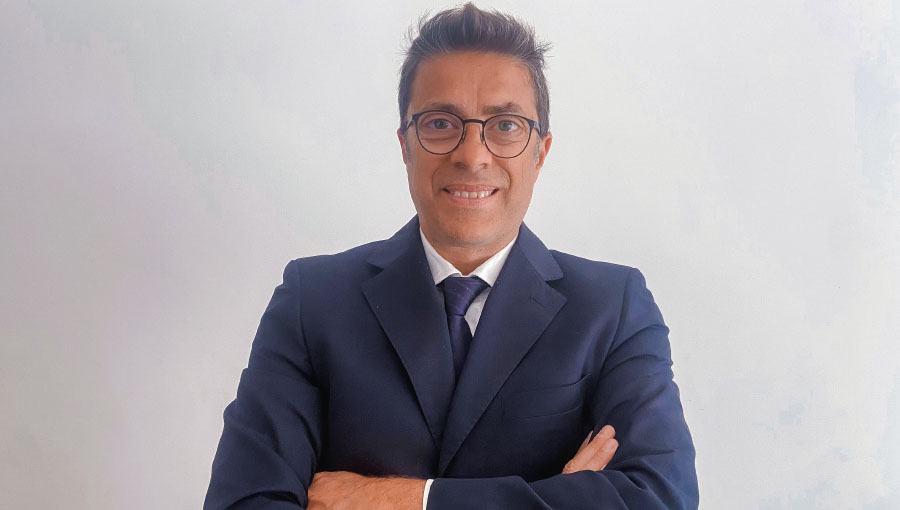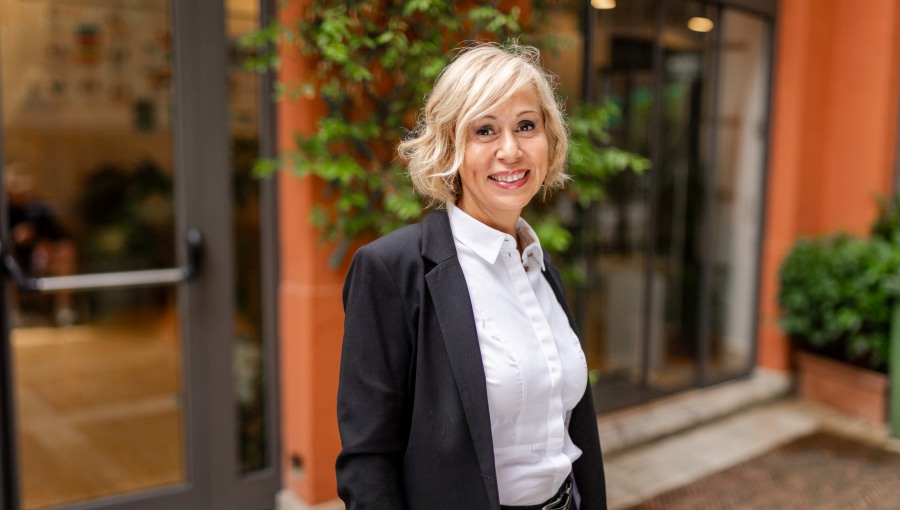A Socially Engaged Curriculum: Professor Peter Sarram
Communications Professor Peter Sarram studied at Boston College, Northwestern University and the University of Milan. Before he started teaching, Prof. Sarram held various jobs, always in the area of media and culture – journalist, radio DJ, and record distributor. Next year will be his 20th year teaching at John Cabot University.
Tell us about your background.
I was born in Rome and my mother was Italian while my father is Iranian. I lived in Rome until the age of 7 and then we moved to Iran where I went to the International School there until the year of the revolution. My parents stayed in Iran the entire time – my father was a university professor there – but I was sent back to Rome. The situation was very tense and while the revolution against the Shah generated high expectations during those early months – it was 1978 – my parents decided that with schools closed and daily demonstrations I would have been safer in Rome. Since I had started an American school I continued that schooling during my high school years in Rome. Going to the US was kind of a natural progression.
I got into Economics in 1982 while most of my peers were getting into Business and Finance Schools, which was really not for me. Economics was a possible alternative. It wasn’t business yet it appeared to be close enough. I had no desire to end up working on Wall Street or become part of the developing ‘yuppie’ worldview. I was into music, punk and other noisy stuff, was already writing for music fanzines and magazines and hanging out at radio stations and record stores, the farthest thing from the aspirations of the time. Economics at least gave me the chance to steer towards a more socially engaged curriculum. In fact my favorite courses were History of Economic Thought (Ricardo, Marx, Keynes), Political Economy, Urban Economics, Labor Economics. Not that it all went smoothly: writing papers or arguing during class discussion as an undergrad, critiquing Reagan and Thatcher’s all-out assault on workers’ rights with professors who had all drunk the monetarist, supply side, Chicago School kool aid of free markets and deregulation made for interesting confrontations, to say the least.
When I finished my BA I came back to Italy, worked for the Wall Street Journal for a year – it seemed like the right thing to do since I wanted to get into journalism even while I continued writing for music and pop culture magazines and journals -, DJ’d on the Radio (the mighty Radio Rock and Radio Città Aperta) and then founded what eventually became one of the most important independent music distributors (and labels) in Italy. When this experience came to an end, I decided to go to grad school. Initially the plan was to study journalism but I eventually ended up in Chicago, at Northwestern with a full scholarship for the MA/PhD track at the Radio-TV-Film program. Much more up my alley. Critical Theory, post-structuralism, media and popular culture, film; a whole world opened up. I TA’d for a number of amazing professors, worked as an adjunct instructor in the Italian and French department while I continued studying and figured teaching was a pretty sweet thing. Continuing on to teach came almost naturally.
Can you tell us more about your days as a record distributor?
We were distributing both local indie labels as well as many of the US and UK indies that in those years were getting ready to make the jump towards the mainstream: SST, Caroline, Dischord, Rough Trade, Sub Pop, Sarah Records for indie rock and lots of hip hop on labels like Tommy Boy and Priority. We struck it big with Sonic Youth and Nirvana –we were the only ones to actually carry Nevermind even though that was already on a major label. The local Italian branch of Geffen didn’t know what to do with them while we had already sold a ton of their first LP when they were on Sub Pop. Our other big scoop was that we were there right at the beginning of Italian hip hop which exploded during a moment of great political turmoil in universities and high schools and the so-called Pantera protests. Just the name of the movement and its logo with the Panther lifted directly from the Black Panther Party insignia is indicative of what importance hip hop was having culturally in the country (these were the pre-gangsta days of politically engaged hip hop of Public Enemy, Paris, A Tribe Called Quest, the Geto Boys, early NWA, Nas). It was like early 70s punk all over again. This was also the period where the question of immigration and racism started being discussed openly and one of the coolest records we produced was by a Sicilian hip hop group (Nuovi Briganti) who had literalized Public Enemy’s “Brothers Gonna Work It Out” in the Italian “I fratelli lavorano fuori”, a celebration of migrant labor. Most of these groups were tied to local activist scenes – in Rome, Milan, Bologna, Palermo – and came out of the centri sociali, the occupied social centers and their records were self-produced. We got them into the record stores. It was a really interesting time to be working in pop music.
What are the benefits of studying Communications in this day and age?
I really do believe that media and communication studies are the very center of any valid approach to understanding our world and societies today. It’s that interdisciplinary thing and even though more traditional and clearly bounded disciplines seem to have a hard time understanding just what it is that we do, when you’re in the thick of it, the so-called ‘benefits’ – even though that’s a loaded term – become self-evident.
Recent political developments such as the rise of “alternative facts” seem to suggest we are moving to a post-factual reality very similar to the idea of hyperreality. How can media theory help us make sense of our current “reality”?
One would tend to conflate the idea of ‘alternative facts’ with the concepts of hyperreality or the other postmodern theorizations of our ‘spectactular’ present. However, when you come to it from one of the theoretical frameworks that are used in media studies two things become very clear: ‘alternative facts’ don’t begin with Kellyanne Conway or anyone else of the propaganda officers of the Trump administration or their agitprop extensions at Breitbart, Infowars or Fox News and have been around for a long time – both as tools and strategies used by power and as concepts identified, analyzed and critiqued by critical media theorists; and that hyperreality as a theoretical concept has little to do with the day to day struggle over establishing contingent political truths.
Hyperreality, the idea that reality has been substituted by something that is more real than reality itself, where signs don’t point to anything outside of themselves is more about describing the wrapping –the shell if you will—within which the struggle over facts is being played out. One is a much more abstract concept, used to describe the structure, while the other is much more practical and is about the content within that structure. It’s visionary Baudrillard vs. the much more practical Chomsky. To see how incommensurable the two concepts are you could get on YouTube and watch the famous Foucault vs Chomsky match from 1971 in Holland where they figuratively beat the crap out of each other over concepts like justice, power, human nature the ‘nature of truth’ and the sources of morals.
The Department of Communications has grown at an incredible pace in recent years. Where is it headed?
It’s true, the department has grown at an amazing pace and we are extremely happy with what we have managed to accomplish in the short time since the major and subsequently the department got going.
Of course we want to continue growing but at this point growth needs to also be a growth in facilities and resources that we put at the disposal of the students (and the faculty). We are also hopeful, along the lines of our collaboration with The New School, that we can move toward introducing graduate courses and eventually a graduate degree.
In the immediate future there is great ferment in putting the TV Studio to work at full capacity and start producing our own programs. Actually, we’re looking for ideas, and talent. If anyone has an idea for a TV program – scripted, unscripted, talk or otherwise, they should come and pitch it.
With so many liberal arts colleges in the US why should one come to JCU?
I think the diversity of students at JCU means that there are just as many reasons for choosing to come here as there are students, since each student is here for very specific reasons. Of course, that diversity is itself one of the main aspects that attracts students to come. JCU is an island of cosmopolitanism and diversity, a space of ethical encounters with ‘others’ in an increasingly fragmented, hostile and identitary world. That’s something to be really proud of.
Can you tell us more about the conference “Fear and Loathing of the Online Self” that you co-organized?
It’s going to be a great conference. Totally of the present, all centered on so-called ‘selfie’ culture and cutting-edge in terms of the ideas that are going to be presented and discussed. What we are trying to do is to go beyond both the easy celebrations of social media as technologies of empowerment and the more pessimistic visions of our subjection to technology and algorithms.
As the title evokes, we want to figuratively be like Hunter S. Thompson in Vegas, without the drugs but still hallucinating our way through the ‘heart of the digital culture’ just like he journeyed through the heart of the American Dream. We’ll look for something that could break our present cultural impasse while coming to terms with our own responsibilities and ambiguities in the ways we confront digital tools and their ability to both oppress and liberate. What we’re trying to ask is what order of contradictions are at play and whether there is any space left for self-determination. It’s an ambitious project but it’ll be extremely interesting to see how media theorists, philosophers, activists, artists, and others who straddle all of these different roles try to come to terms with these questions. There are people coming from all corners of the world like Gabriella Coleman, who wrote the definitive work on Anonymous and Lulz as political strategy, political and media theorist Jodi Dean to whom we owe the concept of ‘communicative capitalism’, digital theorist Wendy Chun, media activist and theorist Franco Berardi as well as Ana Peraica, Katherine Behar and others.
It’s a two day affair, May 22 and 23, on the JCU and Roma Tre campuses. There will be two ‘off-campus’ events: a meeting of the conference participants with activists working in Rome and an exhibit of the artistic works of a number of the participants as well as performances around the theme of the online self and the ‘selfie’.
The conference was organized by Prof. Della Ratta and myself along with Geert Lovink from the Institute of Network Cultures in Amsterdam, one of the historic and still central places to investigate network culture, and Prof. Teresa Numerico of Roma Tre. It would be great if students participated in great numbers. It is truly a unique opportunity to see and listen to some of the most important people that you are actually reading about in your courses.







